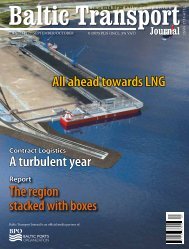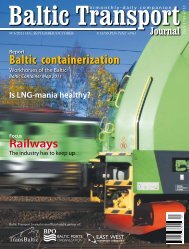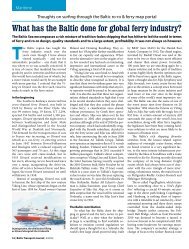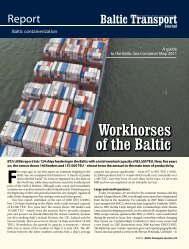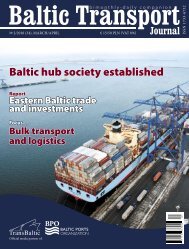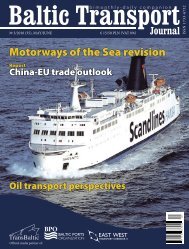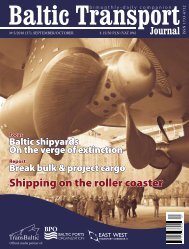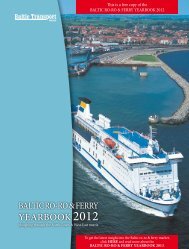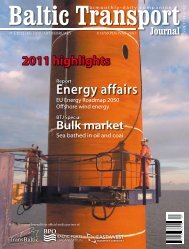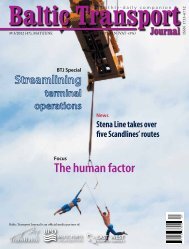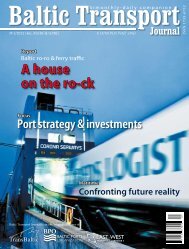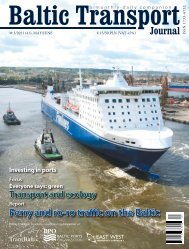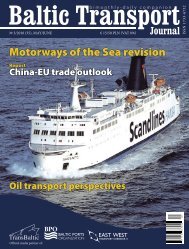Create successful ePaper yourself
Turn your PDF publications into a flip-book with our unique Google optimized e-Paper software.
Report<br />
Göteborg Hamn leading the world’s port business to ecology<br />
Cold ironing can reduce air<br />
pollution and noise at the port<br />
Photo: Port of Göteborg<br />
Nowadays we are accustomed to pay attention to reducing air<br />
emissions from power stations, factories and cars.<br />
Authorities of countries from<br />
all over the world have agreed<br />
to reduce their emissions and<br />
sign proper resolutions. Those<br />
actions have a positive effect.<br />
However, another problem<br />
has surfaced – emissions from ships.<br />
Shipping transport is continuously growing,<br />
ships are bigger and they carry more and more<br />
goods, causing emissions to grow significantly. If<br />
nothing is done, ships’ air emissions will exceed<br />
those from land-based sources by 2020. There are<br />
attempts to minimize this impact in many ways,<br />
e.g., in the <strong>Baltic</strong> Sea area ships are obliged to use<br />
low sulphur fuel (a sulphur content not exceeding<br />
0.1% by mass). This way they emit less sulphur<br />
oxide SOx, which is one of the most dangerous<br />
factors contributing to air pollution. Negative<br />
aspects of shipping are especially important for<br />
38 | <strong>Baltic</strong> <strong>Transport</strong> <strong>Journal</strong> | 3/<strong>2008</strong><br />
people living in port cities. The ships still produce<br />
harmful fumes, noise and vibrations when berthed<br />
at the port. It affects the whole environment;<br />
the health of port workers, onboard personnel,<br />
and the inhabitants of port cities. That is why authorities<br />
from many countries have joined forces<br />
to fight this problem.<br />
The idea presented by Stora Enso<br />
One option is to reduce the negative impact<br />
of ships during their stay in the port.<br />
While a ship is berthing its auxiliary engines<br />
are used for lightning, heating, hot water, fans,<br />
engines, etc. These operations consume diesel<br />
or heavy oil and generate exhaust fumes and<br />
noise. The solution is “cold ironing”, also called<br />
“shore-side power”. “Cold ironing” means<br />
supplying vessels with electricity from the<br />
shore during their stay in port enabling their<br />
auxiliary engines to be shut down and not<br />
use fuels to run necessary operations. Today<br />
this solution is found in a few ports around<br />
the world. The world’s leader here is the port<br />
of Göteborg, Sweden, which first introduced<br />
this concept. The idea was proposed by Stora<br />
Enso, a global pulp and paper company, which<br />
wanted to be environmentally friendly. The<br />
idea was met with interest in Göteborg and<br />
special cooperation between the ship-owners<br />
Cobelfret and Wagenborg Shipping and the<br />
electrical equipment supplier ABB was established.<br />
Some funds were obtained from the<br />
Swedish government. The first ro-ro vessel<br />
successfully used the new high-voltage connection<br />
in January 2000. Expectations came<br />
true – this allowed avoiding forestalled harmful<br />
emissions, noise, and vibrations during an<br />
ordinary ship’s operation while in port. It was<br />
the first electrical connection for ro-ro vessels<br />
in the world; even though low–voltage connec-



